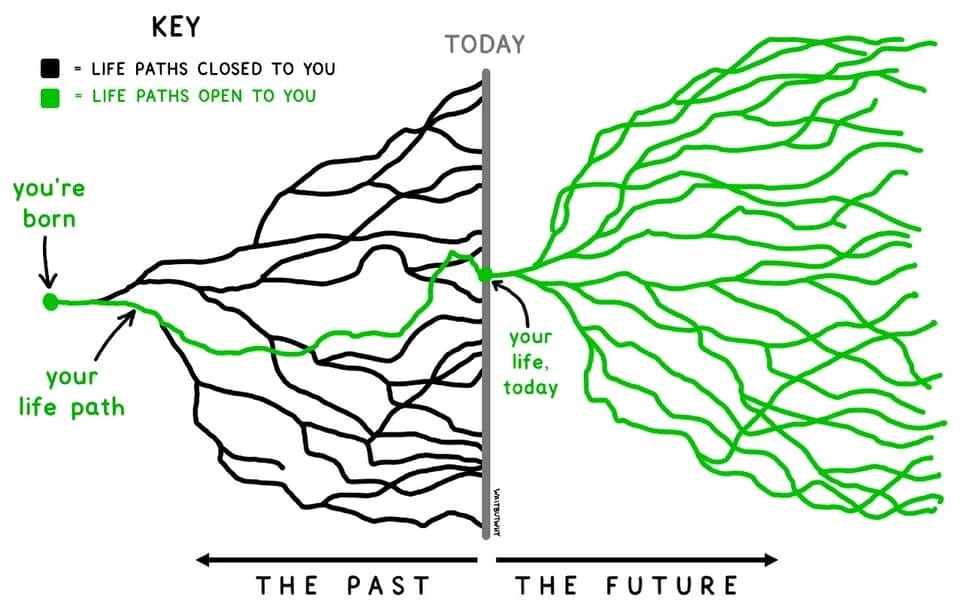⏳ How to Master a Language in 4000 Weeks
Hey Reader, Do you ever feel overwhelmed by your to-do list? Or too busy for the non-urgent projects most important to you? If your answer to either of these questions is yes, you might have a toxic relationship with time. Nurturing your relationship with time can change those answers. It can make you a better learner, creator, and traveler, too. All you have to do is forget everything you've been told about efficiency, productivity, and time management. That's no small task. But you can give yourself a headstart with Oliver Burkeman's eye-opening book, Four Thousand Weeks: Time Management for Mortals. Consider some of Burkeman's contrarian takes:
In Burkeman's point of view, effective time management isn't about getting a million things done in the least amount of time. It's about making peace with your limits, focusing on meaningful action, and forgetting how long it'll take. Whether you're an overcommitted hyper-consumer stuck in the rat race or a self-employed, nomadic minimalist that optimizes for freedom, this book will challenge your beliefs on time and productivity. I know because I've been both. So if you think your relationship with time is preventing you from living a meaningful life, add this book to your reading list. In the meantime, here are 5 of my main takeaways, plus a bunch of ways that you can incorporate them today: 🧘🏻♀️ mindfulnessPay Better Attention"Your experience of being alive consists of nothing other than the sum of everything to which you pay attention."
– Oliver Burkeman, Four Thousand Weeks If productivity is a capitalist trap, then attention is its currency. Pay better attention and you won't fall victim to the trap. That's simple enough. But it's not easy. Every habit serves a purpose. Even the bad ones. And according to Burkeman, the reason you allow distractions to steal your attention away is that they relieve the discomfort of confronting your limited time (i.e. your mortality). Think of the traveler who spends an hour capturing the perfect sunset photo to post later but misses the moment they daydreamed about for months. Or the language learner waiting for their turn to speak instead of noticing the nuance of a native speaker's pronunciation. My best students, on the other hand, have one thing in common: They work hard to become world-class noticers. They focus on the task and pay close attention when they read books, listen to podcasts, watch YouTube, and attend business meetings. That's why they pick up new vocabulary and pronunciation every week. Paying attention can be exhausting, so it's important to remember that you can't notice everything. But you'll never capture anything if you're always distracted. Identify the things that mean the most to you and pay close attention to them. 🐢 slow growthHarness the Power of Patience
"As you dive into life as it really is, in clear-eyed awareness of your limitations, you begin to acquire what has become the least fashionable but perhaps most consequential of superpowers: patience." – Oliver Burkeman, Four Thousand Weeks If you can pay better attention and stop time-traveling out of the present, you start to benefit from the power of patience. If that doesn't convince you, perhaps this paradox will: The faster you try to do something, the longer it takes. This is why slow growth is the best. It's the speed that all meaningful practices demand. Harvard Professor Jennifer Roberts hammers this lesson into her students' heads in their first art history assignment: Choose a work of art at a local museum and look at it for three hours straight. Why three hours? Because it gives them permission to reject their previous programming and exercise the presence and patience that a work of art demands. Some language schools guarantee fluency in three months, but their promise is counterproductive and misses the point. Language is a practice, like yoga, jiu-jitsu, or meditation. So unless you're Neo in The Matrix, it will be a lifelong pursuit. The only way to persevere is to harness the power of patience. Here are a few ways to develop that power:
🏗️ habit designReject Convenience Culture
"Convenience culture seduces us into imagining that we might find room for everything important by eliminating only life’s tedious tasks. But it’s a lie. You have to choose a few things, sacrifice everything else, and deal with the inevitable sense of loss that results." – Oliver Burkeman, Four Thousand Weeks Convenience is the enemy of patience. It makes things easy, and easy is addictive. Less effort means more time for more stuff, or so it seems. In reality, it's a slippery slope. There's always more low-hanging fruit to pick. And if you're not careful, convenience will dominate your decision-making and prevent you from pursuing the out-of-reach stuff that fills your life with meaning.
Here are three ways to avoid the convenience trap:
🥋 self-masterySurrender the Craving for Control
"We have to give up. You surrender to the reality that things just take the time they take, and that you can’t quiet your anxieties by working faster, because it isn’t within your power to force reality’s pace as much as you feel you need to, and because the faster you go, the faster you’ll feel you need to go." – Oliver Burkeman, Four Thousand Weeks Here's a spoiler alert from the book: The day will never arrive when you finally have everything under control. Not only is that true but the more you try to control everything, the more you'll get in your own way. You'll stress out over "using time well" and compulsively manage your time to hang on to the illusion that you're in control. The solution is simple: Surrender. The Germans have a concept called eigenzeit, which roughly means "the time inherent to a process itself." In other words, things take the time that they take, so you should surrender to the process and accept the fact that there's little you can do about it. So how can you apply this to language learning?
🚫 minimalismCommit to the Joy of Missing Out
"As I make hundreds of small choices throughout the day, I’m building a life—but at one and the same time, I’m closing off the possibility of countless others, forever." – Oliver Burkeman, Four Thousand Weeks FOMO (i.e. the fear of missing out) makes overwhelm and busyness look like the most desirable things in life. But until you accept 'missing out' as a necessary part of life, it will only make you delay the decisions that give life meaning. It doesn't matter if your FOMO is caused by workaholism or hedonism, either. The treadmill works the same, and it only gets faster. The smarter alternative is to embrace JOMO: the joy of missing out. Making commitments and deliberately 'missing out' liberates you to take action and enjoy your choice and its rewards. And when you stop second-guessing yourself about the stuff you say no to, you can fully focus on the ones you say yes to. Here's how to practice JOMO in your language journey:
school cafeteria 🍕Things I consumed consciously while writing this
"Your job is to collect good ideas. The more good ideas you collect, the more you can choose from to be influenced by." – Austin Kleon, Steal Like An Artist 📚 Still not sure whether Four Thousand Weeks is the right book for you? Watch the author's TED talk about time management, presence, and meaning and see if it resonates. 🎧 Oliver Burkeman on Making the Most of the Time that We Have The Daily Stoic podcast with Ryan Holiday (Spotify) Ryan Holiday is the bestselling author of a handful of books about stoicism, a philosophical operating system that pairs well with Burkeman's findings. Memento Mori and enjoy. 📥 Japanese Homes Aren’t Built to Last—and That’s the Point Lucy Alexander (Robb Report) Speaking of the effects of confronting our time limitations, here's the introduction to this enlightening article: 📚 Four Thousand Weeks: Time Management for Mortals Oliver Burkeman (Amazon) My takeaways above don't do this book justice, so you should still read it and reach your own conclusions. It's packed with wisdom, stories, and prompts that will make you question your relationship with time management and productivity. 🔂 Monument Röyksopp, Robin (Spotify) Playing this on a loop is still the most hypnotic way I've found to enter a flow state and let things take the time they take. Did you find this useful? Please consider forwarding it to a friend who's on the same journey as you. If your friend sent this email to you and you don't want to miss the next one, you can sign up for more at schoolofjuan.com. Have a great week! – Juan |
3745 NE 171 Street Apt.5, North Miami Beach, Florida 33160 |
School Of Juan 📈
I help you unblock your speaking in your second language with better habits, daily challenges, and curated frameworks 🚀 • Past lives: Synthesis teacher, Time Out editor, hospitality consultant, finance grad, corporate castaway 🏝️ • Now: 🇺🇸 Fluency coach for 🇪🇸🇧🇷 speakers, recovering nomad, autism sib living closer to family 💙
Pre-P.S. Want to start 2024 with more clarity and purpose? Click here to learn about my FREE 21-day annual review challenge, which starts on January 11. Want an added boost of accountability and feedback? Upgrade to the Rocket Fuel version for just $24 and get video feedback from me on your reflections and your English. Happy New Year, Reader! Are you ready to embark on another year in your language journey? A new year brings new hope, energy, and intentions. It's also the perfect window of...
Pre-P.S. You have 1 more day to take advantage of my Black Friday week deals and make a commitment to unblocking your English and speaking it with confidence in 2024. Here's the announcement in case you missed it, and the answers to your most frequently asked questions. You can see the full details of both deals for Rocket Fuel and Rocket Fuel Plus here. Hey Reader, If you ask my students (like I have), Rocket Fuel works. It helps students unblock their English, feel more confident, and speak...
Hey Reader, My best students think long-term, but act daily. They focus on slow growth and build a language practice so that when the right opportunity presents itself, they're ready. Some of these students are disciplined by nature. Others are not. But regardless of which of the two you are, you can manufacture the discipline and motivation you need with commitment devices. As James Clear says, a commitment device is "a choice you make in the present that controls your actions in the...

